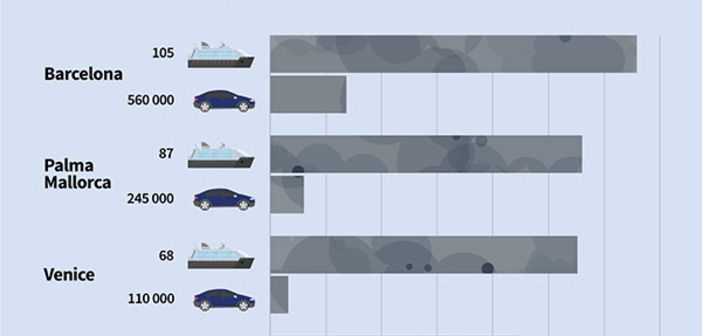A report released by sustainable transport group Transport & Environment (T&E) claims Carnival Corporation, the worlds largest luxury cruise operator, emitted nearly 10 times more sulfur oxide (SOx) around European coasts than did all 260 million registered European cars in 2017. Royal Caribbean Cruises, the worlds second largest luxury cruise operator, is second, yet four times worse than the European car fleet. According to T&Es analysis, Spain, Italy, Greece, France and Norway are the European countries most exposed to SOx air pollution from cruise vessels while Barcelona, Palma de Mallorca and Venice are the most impacted European port cities, followed by Rome and Southampton. Faig Abbasov, shipping policy manager at T&E, says these countries are most exposed because they are major tourist destinations and have less stringent marine sulfur fuel standards, which allows cruise ships to burn the most sulfurous fuel all along their coastlines. Luxury cruise ships are floating cities powered by some of the dirtiest fuel possible, said Abbasov. Cities are rightly banning dirty diesel cars but theyre giving a free pass to cruise companies that spew out toxic fumes that do immeasurable harm both to those on board and on nearby shores. This is unacceptable. The report also states that nitrogen oxide (NOx) emissions from cruise ships in Europe also heavily impact some cities, equivalent to about 15% of the NOx emitted by Europes passenger car fleet in a year. T&E claims in Marseille, for example, 57 cruise ships emitted in 2017 almost as much NOx as a quarter of the citys 340,000 passenger cars. Meanwhile, a handful of cruise ships operating along the coasts of countries such as Norway, Denmark, Greece, Croatia and Malta are reportedly responsible for more NOx than the majority of those countries domestic car fleets. T&E recommends Europe implements a zero-emission port standard as soon as possible, [which] could then be extended to other ship types. The report also recommends extending emission control areas, currently in place only in the North Sea, Baltic Sea and English Channel, to the rest of the European seas. Furthermore, the report recommends regulating NOx emissions from existing ships which are currently exempt from NOx standards applying in emission control areas. Abbasov concluded: There are enough mature technologies to clean up cruise ships. Shoreside electricity can help cut in-port emissions, batteries are a solution for shorter distances, and hydrogen technology can power even the biggest cruise ships. The cruise sector is apparently not willing to make the shift voluntarily, so we need governments to step in and mandate zero emission standards.
T&E claims Carnival ship fleet emits 10 times more SOx than all European cars

Previous ArticleCountdown to Electric & Hybrid Marine World Expo 2019
Next Article UK to insist on zero emissions ships from 2025


